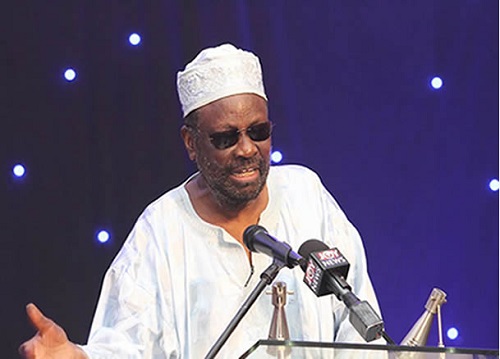IT would be a demonstration of false modesty if I failed to humbly acknowledge that the Asantehene, Otumfoↄ Ↄsἑe Tutu The Second, sent a very warm feeling through my being when at a meeting with the Asante House of Chiefs on 15 December, 2022, he mentioned my name and said he agreed with something I had written in one of articles.
Otumfoↄ said QUOTE:
”CAMERON DUODU, a Citizen Journalist who writes articles in the newspapers— he said in one of his articles that he was surprised to hear that some Nananom [Chiefs] had said that they had no power to stop galamsey. When I read it, I said, what he says is true, because if you, the chief, who has been given land to take care of, say at Bekwai or Mampong – you who now looks after all that land –if someone has come to that land and is doing galamsey on it, and you haven’t agreed to it, you have no power to say ‘No’ to him?
Whereas, if someone had encroached on your borders and taken your land, you would swear The Great Oath of Otumfoↄ and bring him before me? So as for this, Nananom, we are all in it. Whoever has galamsey on his land is involved in it. Whoever has land on which the water is being destroyed – someone has come to your land and is destroying the water your people drink — you are involved!
“So, you say he has a gun. Well, don’t go there. Come to Kumase and report it to me. Just as you would report to me if someone swore the Great Oath. Come and tell me and I shall request the Regional Minister to send soldiers there. So, from now on, any chief who sits by and allows galamsey to take place on his land, we shall call him here and ask him, how is it that you sat there and allowed galamsey to take place on your land?
“If someone had signed a contract and come to show you a piece of paper and because of that, you allowed him to destroy your water and your land, then it means you know something about it. We shall institute a charge against you.
“These are days when the environment is being taken seriously at a global level. You all heard about what happened at the COP 27 conferences in Cairo. And we sit here and destroy our water and our land? From next year, we shall comb Asante’s lands. If there is galamsey is on your land, we shall ask you why. We shall ask ‘what do you rule the land for? Your ancestors left it to you and you are watching it destroyed. Why?” UNQUOTE
The Asantehene could have gone on to explain that there are two types of “power” – hard power and soft power. Hard power consists of using “sticks and carrots” to get someone to do as one wishes, whereas soft power employs culture and persuasion to achieve the same ends.
In our culture, for insane, society can punish errant members in several sorts of ways. Among the most effective are naming and shaming. The proverbs, “a good name is better than riches” and “disgrace does not befit an Akan-born person.” illustrate how much importance is attached to a respected “status” in or traditional society. We call an elderly person, or an office-holder, “an elder”. We call a chief “Nana” – the same appellation we give to our grand-parents. And there are ancillary qualities we value – we don’t want to fall into debt; we look down on sexual misbehaviour and we consider going to prison an exercise that “dirties” a person’s soul.
Other forms of social punishment are: to refuse to take someone’s hand when it is offered as a sign of greeting; and to close one’s eyes firmly, sand frown when someone looks one in the eye. To refuse to respond when one is greeted with “good morning” or good afternoon” or “good evening” is also a sign of ill-will that must be taken seriously.
The above are normally interactions that occur between one individual and another. When such signs of displeasure extend beyond the individuals into the society at large, they become more serious. An errant member of society can be banned from visiting the chief’s palace; or the home of his or her clan-head. The very worst of the social punishments is to be named, in a “gongong” message that is “broadcast” through the streets, as someone whom everyone should shun.
In the past, such punishments could lead to suicide, for Ghanaians are normally gregarious persons, and ostracism, (even of a minor nature, can lead to trauma and depression. Therefore the traditional social setup in Ghana can be utilised by a chief who takes his leadership role seriously, to prevent horrendous practices like galamsey, from posing an existential threat to society, by endangering the lives of millions of those alive as well as the as-yet-unborn.
Finally, there is the collective civil defence option. Every village in Ghana has a self-defence mechanism that has been bequeathed by the ancestors of the current inhabitants. It is to these groups, known as the “Asafo” (literally mass formation) that the military defence of the locality was entrusted. They are called into existence as soon as a threat is perceived, and since, in peacetime, they practise defence manoeuvres and war games, they fall to line and provide a proficient defence mechanism whenever they are mobilised by their local leadership. They, of course, never “fight” alone, for they have alliances formed ages ago, that extend to the nearby localities all the way up to the state capital. So they never fight alone,#
In effect, it is this MULTIFARIOUS system of traditional self-defence that the Asantehene could resurrect in leading his people to stop galamsey.
By Cameron Duodu


